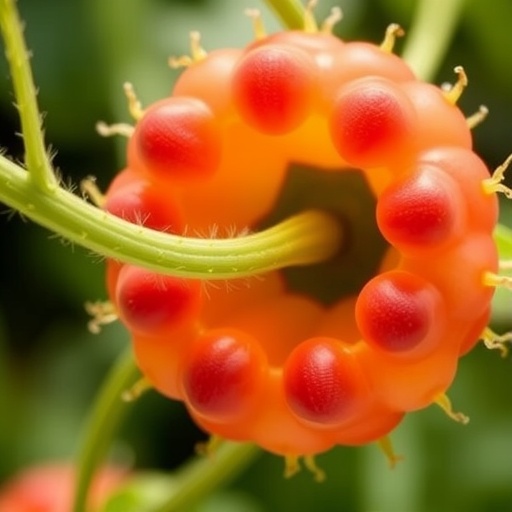In a groundbreaking advancement for plant biology and biotechnology, researchers have uncovered specific transit peptides that significantly enhance the import of proteins into plastids across various tissues and plant species. This discovery, reported in Nature Plants in 2025, promises to revolutionize how scientists manipulate plastid function, with profound implications for crop engineering, photosynthesis enhancement, and synthetic biology applications.
Plastids, the multipurpose organelles including chloroplasts, are essential hubs for numerous biochemical pathways in plants. These organelles depend heavily on the import of nucleus-encoded proteins synthesized in the cytosol. Transport of these proteins is mediated by transit peptides—short amino acid sequences that tag these proteins for import into plastids. While the general process of plastid protein import has been studied for decades, identifying transit peptides that universally boost import efficiency in different tissue types and across diverse plant species has posed a formidable challenge.
This recent research overcomes these limitations by employing an integrative approach combining high-throughput screening, advanced bioinformatics, and experimental validation in multiple plant models. Using synthetic biology tools, the team systematically analyzed the functional efficacy of a broad library of transit peptides across leaves, roots, and reproductive tissues. Their methodology allowed for quantitative assessment of plastid import efficiency, revealing a subset of transit peptides with superior performance compared to traditional sequences.
One of the critical insights from the study highlights the tissue-dependent variability in plastid protein import. Although chloroplasts in photosynthetic tissues have been the primary focus of plastid research, non-green plastids in roots and reproductive organs perform vital metabolic roles. By evaluating the context-specific behavior of transit peptides, the researchers identified peptides that not only boost import efficiency in mesophyll chloroplasts but also markedly improve import in leucoplasts and chromoplasts.
Moreover, the examination across various species, from model plants like Arabidopsis thaliana to economically important crops such as tomato and maize, underscores the versatility and translational potential of these transit peptides. The researchers demonstrated that some transit peptides conferred high import efficiency regardless of the plant species, thereby enabling a universal toolkit for plastid engineering across the plant kingdom.
Delving deeper into the molecular mechanisms, the study uncovered that the enhanced import efficiency is linked to specific sequence motifs within the transit peptides. These motifs appear to optimize the interaction with components of the translocon complexes at both the outer and inner envelope membranes of plastids. Structural modeling and mutagenesis experiments suggest that these sequences facilitate improved recognition and translocation kinetics, effectively accelerating the import process without compromising plastid integrity.
The implications of this discovery extend far beyond basic science. In agriculture, the ability to efficiently target proteins to plastids in diverse tissues opens avenues for metabolic engineering aimed at enhancing nutritional content, stress resilience, and pathogen resistance. For instance, boosting the import of enzymes involved in vitamin biosynthesis or lipid metabolism in fruit-specific plastids can lead to crops with improved dietary value.
Furthermore, the findings have notable significance for synthetic biology, particularly in the design of plastid-based bioreactors. Plastids offer an attractive platform for producing high-value compounds, including pharmaceuticals, biofuels, and industrial enzymes. The improved transit peptides facilitate robust expression and import of synthetic pathways, thereby increasing yield and reducing costs.
Interestingly, the study also addresses longstanding questions surrounding the evolution of transit peptide diversity. Comparative analyses indicate that the identified high-efficiency peptides share evolutionary conserved features, hinting at a co-evolutionary adaptation between transit peptides and plastid import machinery to optimize protein targeting across varying cellular environments.
Another striking aspect of the research is its contribution to unraveling plastid heterogeneity within the same plant. Tissues may house plastids at different developmental stages or functional states, affecting protein import dynamics. By fine-tuning transit peptide selection, researchers can now tailor protein targeting strategies to these subtleties, enhancing experimental precision and biotechnological outcomes.
The researchers employed state-of-the-art fluorescence microscopy along with mass spectrometry-based proteomics to validate the successful import of target proteins fused with the newly identified transit peptides. These methodologies provided compelling evidence for enhanced protein accumulation within plastids, corroborating functional activity without deleterious effects on plastid or cellular physiology.
Given the comprehensive scope of this work, it sets a new standard for protein targeting research in plants. It emphasizes the importance of considering tissue specificity, species diversity, and molecular nuances simultaneously. Such a multi-dimensional approach is likely to become a blueprint for future studies aiming at organelle-targeted bioengineering.
In light of these advancements, it is conceivable that synthetic transit peptides optimized for particular applications will soon be commercially available. This would significantly streamline the development of genetically engineered crops and facilitate biotechnological innovations targeting food security and sustainability challenges.
While the primary focus was on plastids, the principles elucidated may have parallels in other organelle targeting systems, such as mitochondria or peroxisomes, expanding the broader impact of this research. Cross-organelle comparative studies could leverage these insights to improve import mechanisms universally across eukaryotes.
The study also raises intriguing prospects for fundamental research into signal peptide evolution and organelle biogenesis. Understanding how transit peptides modulate import efficacy offers a window into the intricate communication between the nucleus and plastids, central to cellular coordination and adaptation.
Overall, the identification of transit peptides that boost plastid protein import marks a transformative milestone in plant molecular biology. This breakthrough lays a robust foundation for future research and technological exploitation, promising to accelerate the pace of innovation in plant science and agriculture worldwide.
Subject of Research: Identification of transit peptides that enhance plastid protein import efficiency across different tissues and plant species.
Article Title: Identification of transit peptides that boost plastid protein import in different tissues and plant species.
Article References:
Identification of transit peptides that boost plastid protein import in different tissues and plant species. Nat. Plants (2025). https://doi.org/10.1038/s41477-025-02021-w
Image Credits: AI Generated




